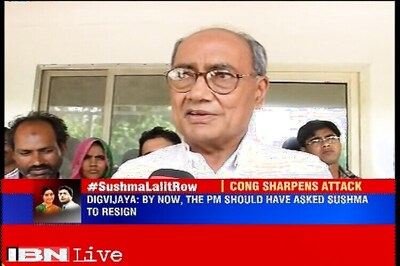
views
Islamabad: The United States must stop blaming Islamabad for regional instability, Pakistan's prime minister told a gathering of the country's political leaders on Thursday, as Washington stepped up pressure on the South Asian nation to tackle militancy.
"The blame game should end, and Pakistan's sensitive national interests should be respected," Yusuf Raza Gilani said in comments carried live on local television stations.
Pakistani military officials, who set security and foreign policy, were expected to brief the meeting, where the possibility of unilateral US military steps against militants in Pakistan could be discussed.
"Solutions to issues based on perceptions should be sought through meaningful negotiations. Pakistan cannot be pressurised to 'do more.'" Gilani told officials including the head of Pakistan's military spy service, Lieutenant-general Ahmad Shuja Pasha, and army chief General Ashfaq Kayani, arguably the most powerful man in Pakistan.
"Our national interests should be respected in all circumstances. From our side, all doors for negotiations are open. We desire the international community's cooperation."
Pakistan says it has made more sacrifices than any other country in the war on militancy, losing about 10,000 soldiers and security forces.
But support is growing in the US Congress for expanding American military action in Pakistan beyond the drone strikes that already target militants, a senior Republican senator said.
The comments by Senator Lindsey Graham, an influential Republican voice on foreign policy and military affairs, follow remarks by the top US military officer, Admiral Mike Mullen, accusing Pakistan last week of supporting the militant Haqqani network's September 13 attack on the US embassy in Kabul.
Islamabad, which has received billions of dollars of US aid despite its reluctance to go after the Haqqani network, faces the most intense pressure to tackle militancy since it joined the US "war on terror" a decade ago.
Pakistan's military faced withering public criticism after the United States' unilateral raid that killed al Qaeda leader Osama bin Laden in a Pakistani garrison town in May.
A similar US operation against militant leaders in North Waziristan on the Afghan border, where American officials say the Haqqanis are based, would be another humiliation for the powerful military.
Graham said in an interview with Reuters that US lawmakers might support military options beyond drone strikes that have been going on for years inside Pakistani territory.
Those options may include using US bomber planes within Pakistan. The South Carolina Republican said he did not advocate sending US ground troops into Pakistan.
"I would say when it comes to defending American troops, you don't want to limit yourself," Graham said. "This is not a boots-on-the-ground engagement -- I'm not talking about that, but we have a lot of assets beyond drones."
Graham said US lawmakers will think about stepping up the military pressure. "If people believe it's gotten to the point that is the only way really to protect our interests, I think there would be a lot of support," he said.
Pakistan was designated a major non-Nato ally by the United States for its support of coalition military operations in Afghanistan after the September 11, 2001 attacks.
But their relationship is marred by mistrust. Pakistan, regarded as critical to US efforts to stabilise Afghanistan, is often described as an unreliable partner.
Following US accusations that some in the Pakistani government have aided anti-US militants, Congress is re-evaluating its 2009 promise to triple non-military aid to Pakistan to a total of USD 7.5 billion over five years.
The non-military aid came on top of billions in security assistance Washington has provided since 2001, and is now rethinking as well.
Any unilateral US military action would deepen anti-American sentiment which already runs high in Pakistan over drone strikes and other issues.
Many people question why thousands of Pakistani soldiers have died fighting what they believe is strictly America's war on militants since the September 11, 2001 attacks.
Pakistani politicians will have those sentiments in mind when they formulate a message for the United States in the all-party talks.
The Haqqani network is allied with Afghanistan's Taliban and is believed to have close links to al Qaeda. It fights US and NATO forces in eastern Afghanistan.
The group's leader says it is no longer based in North Waziristan and feels secure operating in Afghanistan after making battlefield gains.
Pakistan has vowed to help all sides create peace in Afghanistan, but Kabul has been deeply distrustful of Islamabad's objectives.



















Comments
0 comment